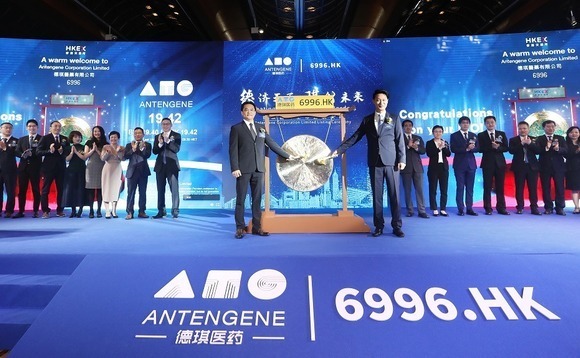
PE-backed Antengene trades flat after $359m HK IPO

Antengene, a China-based drug developer that previously raised $238 million across three private funding rounds, closed roughly flat on its first day of trading in Hong Kong following a HK$2.78 billion ($359 million) IPO.
The company sold 154.1 million shares for HK$18.08 apiece, the top end of the indicative range, according to a filing. Ten cornerstone investors, including Fidelity, GIC Private, BlackRock, Boyu Capital, Hillhouse Capital, and Sequoia Capital China, accounted for $179.4 million of the offering.
The stock opened at HK$19.40 on November 20 but slipped back to close at HK$18.10. Antengene has a market capitalization of approximately $1.57 billion; this compares to a post-money valuation of $726 million on closing its Series C round in July.
Antengene was founded in 2017 by Jay Mei, previously of Novartis Oncology, Celgene Corporation, and Johnson & Johnson Pharmaceutical. He leads a 53-strong R&D team that focuses on treatments for oncology and hematology. It has a pipeline of 12 drugs, of which two are in phase-two clinical trials. Four more are classified as early-stage clinical assets, while a further six are preclinical.
The most advanced drug candidate, Selinexor, targets specific blood cancers, namely relapsed refractory multiple myeloma and diffuse large B-cell lymphoma. Antengene acquired the exclusive Asia Pacific rights from NASDAQ-listed Karyopharm, which has already secured new drug application (NDA) approval in the US. The other phase-two drug – Onatasertib, a treatment for solid tumors – is the product of a collaboration with Celgene, a subsidiary of Bristol-Myers Squibb.
Everything in the pipeline apart from the preclinical drugs is in-licensed from global pharmaceutical companies, with Antengene holding the full or partial Asia development rights. Investigational new drug (IND) applications are expected to be submitted for the preclinical candidates in the next 12-24 months in Australia, the US, and China.
The company's revenue is negligible – it listed under provisions that allow IPOs by pre-revenue biotech companies in Hong Kong – and it incurs substantial losses due to R&D expenses. The net loss for 2019 was RMB323.8 million ($49.3 million), up from RMB145.9 million the previous year. For the first six months of 2020, the loss was RMB537.7 million.
Boyu is the largest external investor, with a post-IPO stake of 9.91%, having co-led Antengene's $120 million Series B round with FountainVest Partners in late 2018. FountainVest has 8.53%. Qiming Venture Partners, which led the $21 million Series A in 2017, has 6.01%. Celgene owns 8.07% of the company.
TF Capital, HG Capital and Tigermed Investment – the corporate VC arm of contract research organization (CRO) Tigermed – took part in the Series A alongside Qiming. Qiming and TF re-upped in the Series B, which also featured Celgene, WuXi Corporate Venture Fund, and Taikang Insurance Group. The $97 million Series C in July was led by Fidelity.
Latest News
Asian GPs slow implementation of ESG policies - survey
Asia-based private equity firms are assigning more dedicated resources to environment, social, and governance (ESG) programmes, but policy changes have slowed in the past 12 months, in part due to concerns raised internally and by LPs, according to a...
Singapore fintech start-up LXA gets $10m seed round
New Enterprise Associates (NEA) has led a USD 10m seed round for Singapore’s LXA, a financial technology start-up launched by a former Asia senior executive at The Blackstone Group.
India's InCred announces $60m round, claims unicorn status
Indian non-bank lender InCred Financial Services said it has received INR 5bn (USD 60m) at a valuation of at least USD 1bn from unnamed investors including “a global private equity fund.”
Insight leads $50m round for Australia's Roller
Insight Partners has led a USD 50m round for Australia’s Roller, a venue management software provider specializing in family fun parks.








